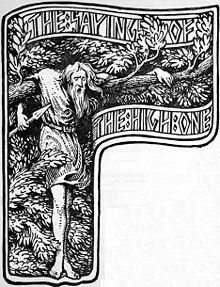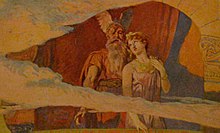List of knowledge deities
(Redirected from Knowledge deity)


A knowledge deity is a deity in mythology associated with knowledge, wisdom, or intelligence.
Akan mythology[edit]
- Anansi, associated with stories, wisdom, knowledge, and trickery, most commonly depicted as a spider
- Abena Motianim, Goddess of wisdom, knowledge and divination.
Ancient Egyptian mythology[edit]
- Neith, goddess sometimes associated with wisdom
- Thoth, originally a moon deity, later became the god of knowledge and wisdom and the scribe of the gods
- Sia, the deification of wisdom
- Isis, goddess of wisdom, magic and kingship. She was said to be "more clever than a million gods".
- Seshat, goddess of wisdom, knowledge, and writing. Scribe of the gods. Credited with the invention of writing and the alphabet. Later demoted to consort of Thoth.[1]
Armenian mythology[edit]
- Anahit, goddess of wisdom[2]
- Tir, the god of written language, schooling, rhetoric, wisdom, and the arts[3]
Aztec mythology[edit]
- Quetzalcoatl, god of the winds, art, culture, and wisdom, as well as the patron god of learning and knowledge.[4]
Caribbean mythology[edit]
- Papa Legba, loa of speech, communication, understanding, and guardian of crossroads[5]
Celtic mythology[edit]
- Ogma, a figure from Irish and Scottish mythology, said to have invented the Ogham alphabet[6]
- Ceridwen, a figure from Welsh mythology, said to be the keeper of the cauldron of knowledge, mother of transformation and the white lady of inspiration and death.
Chinese mythology[edit]
- Wenchang Wang, the god of literature and scholarship
- Kui Xing, God of examinations
- Zhuyu Xingjun, God of examination successes
- Guan Yu, God of military exams
- Lu Dongbin, God of daoist inner alchemy knowledge
- Laozi, God of wisdom
- Bao Zheng, Star of literature
- Manjushri, the bodhisattva of wisdom[7][8]
Christianity[edit]
- The Holy Spirit is the person of the Triune Godhead who is tasked with guiding humans towards knowledge of righteous action. The Spirit's duties includes pointing non-believers towards knowledge of the Christian faith, and the faithful towards knowledge of right and just action and lifestyle.[9]
- God (in reference to the entire Triune Godhead) in Christianity is typically considered to be omniscient, or possessing all knowledge. [10]
Etruscan mythology[edit]
Greek mythology[edit]
- Apollo, god of oracles, knowledge, civilization, music, healing, education, and youth
- Athena, Olympian goddess of wisdom, civilization, weaving, and war strategy
- Coeus, Titan of the inquisitive mind, his name meaning "query" or "questioning". He is the grandfather of Apollo.
- Metis, the Titan associated most closely with wisdom and the mother of Athena, whose name in Ancient Greek described a combination of wisdom and cunning.[12][13]
- Mnemosyne, Titan of memory, and one of the deities worshipped by the Cult of Asclepius in hopes that she would help supplicants remember visions[14]
Hinduism[edit]

- Saraswati, goddess of knowledge, creativity, and speech
- Ganesha, god of wisdom, luck, and new beginnings
- Kartikeya, god of war, victory, and knowledge
- Brihaspati, guru of the devas
- Shukra, guru of the asuras
- Dakshinamurti, an aspect of Shiva as the guru of sages
- Hayagriva, an aspect of Vishnu and the god of knowledge
- Gayatri, a form of Saraswati and the goddess of hymns
- Savitri, a form of Saraswati and goddess of wisdom[15][16]
Hittite mythology[edit]
Japanese mythology[edit]
- Benzaiten, a Japanese form of Saraswati, goddess of everything that flows: water, words, speech, eloquence, music and by extension, knowledge.
- Fukurokuju, god of wisdom and longevity
- Kuebiko, scarecrow god of wisdom and agriculture
- Omoikane, Shinto god of wisdom and intelligence
- Tenjin, god of scholarship[19][20]
Middle Eastern mythology[edit]
- Al-Kutbay, Nabataean god of knowledge and writing
- Enki, Sumerian god of intelligence, crafts, mischief, water, and creation
- Nabu, Babylonian god of wisdom and writing
- Ninimma, a minor Mesopotamian goddess regarded as the scribe and scholar of Enlil
- Nisaba, Sumerian goddess of writing, learning, and the harvest[21]
Muisca mythology[edit]
Neoplatonism[edit]
- Nous, the cosmic embodiment of knowledge and intellect.
Lakota mythology[edit]
- Hnašká, Lakota frog spirit of pezuota (sacred medicine)
- Hunúŋpa, Lakota bear spirit of wóksape (Lakota concept of sacred knowledge), lesser spirit of knowledge
- Iktómi, Lakota spider spirit of wóksape and trickery, greater knowledge spirit
- Kssa, Oglala spirit of knowledge, sometimes considered Iktómi before being stripped of his title
- Matȟó, Lakota mischievous healer spirit, taught the Lakota to fish
- Ptesáŋwiŋ/White buffalo calf woman, Lakota prophetess, often conflated with Wohpe
- Wiyóhiyaŋpa, Lakota wind spirit of the east, oversees new beginnings and knowledge
- Whapiya/Wóhpe, Lakota spirit of knowledge, wishes, dreams, visions, prophecy and the wife of Okaga the south wind
- Zuzéča, Lakota snake spirit of hidden knowledge and lies
Norse mythology[edit]

- Mimir, god of wisdom
- Odin, god of wisdom who nevertheless relentlessly keeps searching for more knowledge; associated with the runes
- Frigg, she is said to know the future, but never tells. The three following goddesses may be hypostases of her.
- Gefjon, goddess associated with plowing, foreknowledge, and virginity.
- Sága, goddess of wisdom
- Snotra, goddess associated with wisdom
- Vör, goddess associated with wisdom[23]
- Numerous minor characters in Norse mythology are said to be very wise, though there's often no instance of them demonstrating this supposed wisdom:
- Dwarfs, particularly Alviss, whose name means "all-wise". Thor keeps him from marrying his daughter by challenging him to a wisdom contest that lasts all night. He's turned to stone by the rising sun.
- Elfs possibly
- Heimdallr
- Kvasir
- Mimir
- Tyr
- Utgard-Loki, while not outright stated to be wise, he's notable for being the only giant to be cleverer than the gods and getting to escape with his life
- Vafthrudnir, a wise jotunn Odin seeks out to challenge to a wisdom contest[24]
- the Vanir in general[25]
Persian mythology[edit]
- Anahita, goddess of wisdom
- Ahura Mazda, Zoroastrian god of light, benevolence, creation, truth, and perfect wisdom
- Chista, goddess of wisdom and knowledge, she leads the mortals to the right way in life and the afterlife; she is also the goddess of religion in Zoroastrian mythology.[26]

Polynesian mythology[edit]
Roman mythology[edit]
- Egeria, a water nymph who gives wisdom and prophecy in return for libations of water or milk at her sacred grove
- Fabulinus, the God who teaches children to speak
- Minerva, goddess of wisdom and crafts, the Roman equivalent of Athena
- Providentia, goddess of forethought
- Neptune, the god of the sea and freshwater, is said to have all the knowledge of water.[28]
Slavic mythology[edit]
- Gamayun - symbol of knowledge and wisdom[citation needed]
- Veles - Veles has been the most revered god in the Vedic pantheon of Slavic culture since ancient times. He is the patron saint of the interworld — both Light and Darkness are subject to him, he is also called Prophetic, Wise, because in the three worlds he manifests his power, he is the one who knows light and darkness, sets the energy of the world in motion, rotates the Universe, he is a permanent guardian on the border of the worlds, a spiritual mentor, he knows all the secrets of the universe.
Turco-Mongol mythology[edit]
Vietnamese mythology[edit]
- Nữ thần nghề mộc, the goddess who taught mankind how to create everyday utensils.
- Văn Xương, god of exams, he holds the honor and career of those who follow the academic path.
References[edit]
- ^ "Ancient Gods of Egypt". discoverinegypt.com.
- ^ "the-goddess-of-love-and-fertility-anahit". 21 August 2017.
- ^ Herouni, Paris (2004). Armenians and Old Armenia. Yerevan. pp. 8, 133. ISBN 9789994101016.
{{cite book}}: CS1 maint: location missing publisher (link) - ^ Smith 2003 p. 213
- ^ Herskovits, Melville J. (1937). "African Gods and Catholic Saints in New World Negro Belief". American Anthropologist. 39 (4): 635–643. doi:10.1525/aa.1937.39.4.02a00080.
- ^ Jones, Mary. "The Ogham Tract". Celtic Literature Collective. Retrieved 21 October 2019.
- ^ 民間信仰的神明概念 [Hierarchic organisation of the spiritual world]. web.sgjh.tn.edu.tw.
- ^ Hackin, J. (1932). Asiatic Mythology: A Detailed Description and Explanation of the Mythologies of All the Great Nations of Asia. Asian Educational Services.
- ^ Millard J. Erickson (1992). Introducing Christian Doctrine. Baker Book House. pp. 265–270.
- ^ "What does it mean that God is omniscient?". GotQuestions.org. Retrieved 2023-05-18.
- ^ de Grummond, Etruscan Myth, Sacred History and Legend
- ^ "Volume: Hellas, Article: Greek Mythology". Encyclopaedia The Helios. 1952.
- ^ Homer, Iliad, 8. An epic poem about the Battle of Troy. 366–369
- ^ Ahearne-Kroll, Stephen P. (April 2014). "Mnemosyne at the Asklepieia". Classical Philology. 109 (2): 99–118. doi:10.1086/675272. S2CID 162319084.
- ^ Arthur Anthony Macdonell (1978). Vedic Mythology. Motilal Banarsidass (Reprint). ISBN 978-81-208-1113-3.
- ^ Yves Bonnefoy (1993). Asian Mythologies. University of Chicago Press. ISBN 978-0-226-06456-7.
- ^ J. G. Macqueen, '"Hattian Mythology and Hittite Monarchy'", Anatolian Studies (1959).
- ^ R.Lebrun, "Le zoomorphisme dans la religion hittite," L'Animal, l'homme, le dieu dans le Proche-Orient ancien, (Leuven) 1985:95-103, noted in Beckman 1989.
- ^ Chamberlain, Basil Hall (2008). The Kojiki: Japanese Records of Ancient Matters. Forgotten Books. ISBN 978-1-60506-938-8. Retrieved 9 February 2011.
- ^ Kelsey, W. Michael (1983). "Untitled", Asian Folklore Studies Vol 42
- ^ Bertman, Stephen (2005). Handbook to Life in Ancient Mesopotamia (Paperback ed.). Oxford: Oxford University Press. p. 122. ISBN 9780195183641. Retrieved 2016-08-08.
- ^ Hermann & Bullock, 1954
- ^ "The Children of Odin". gatewaytotheclassics.com.
- ^ Orchard (1997:170).
- ^ Du Chaillu, P. B. (1889).
- ^ "The Library of the world's myths and legends" (PDF). dl.lilibook.ir.
- ^ "Handbook of Polynesian Mythology". academia.edu.
- ^ "Roman Gods and Goddesses" (PDF). wetheredccn12.com.
- ^ "The Gods of Turks". milliyet.com.
